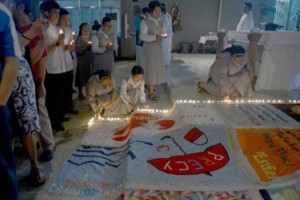SYDNEY: Myanmar Nobel laureate Aung San Suu Kyi and Unaids director Michael Sidibe unveiled a new campaign on Sunday targeting prejudice against human immunodeficiency virus/acquired immunodeficiency syndrome (HIV/AIDS) sufferers, with the world’s first Zero Discrimination Day to be held on March 1, 2014.
Sidibe said scientific breakthroughs and visionary leadership meant there was now an end in sight to “an epidemic that has wrought such staggering devastation around the world.”
“But make no mistake, stigma, denial and complacency are still among us, putting us in danger of failing the next generation,” he said.
The pair spoke in Melbourne at the Australian launch of AIDS 2014, a major global health and policy conference to be held in the city in July with 14,000 delegates from almost 200 countries.
Sharon Lewin, an infectious diseases professor and co-chair of AIDS 2014, said there had been substantial progress in the global response to HIV.
A total of 25 countries—many in sub-Saharan Africa—reported a 50 percent reduction in new infections last year due to increased availability of treatments.
But Lewin said there were still at-risk populations not seeking help and places where new diagnoses were increasing, including in Australia where young men were having unprotected sex with men due to complacency about the disease.
“In the ’80s to the mid-90s, HIV was an incredibly scary prospect—no treatment, enormous stigma and discrimination, early death,” Lewin told Agence France-Presse of the disease which was first identified some 30 years ago.
“It’s not as scary any more but it’s still a significant chronic illness that has a big impact on people’s lives.”
Last year, 1.6 million people died from AIDS-related causes, down from 1.8 million in 2011 and 2.3 million in 2005, according to the United Nations.
In its annual report on the state of the global pandemic released in September, Unaids said new HIV infections had plummeted by a third overall since 2001 and more than halved among children.
But Lewin said the world was at a crossroads with HIV.
“We have come so far and there have been so many successes,” she said. “But still there are so many challenges, the biggest being that we know what works, but yet we still can’t broadly implement it.”
Suu Kyi urged greater openness and compassion in the global struggle against AIDS.
Suu Kyi, the Unaids global advocate for HIV/AIDS victims, drew parallels between the plight of sufferers and her own struggle for democracy.
“The fight against discrimination is an extension of our fight for freedom from fear,” said the Myanmar opposition leader and democracy icon, using the title of a famous essay she wrote.
“My simple message as the global ambassador for zero discrimination is it all starts in the mind and in the heart. There must be less calculation and more warmth, more love, more affection, more compassion.
“We must have our differences and we must recognize them, but these differences should be an opportunity for us to be more complete human beings.”
AFP


